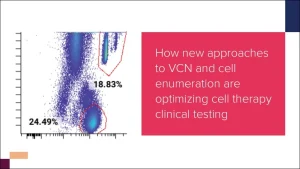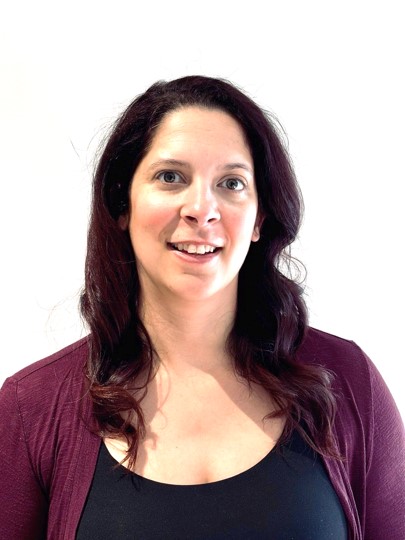July 16, 2024

Cell therapy targets, constructs, and agents are expanding and diversifying — fast. Clinical testing must now comprehensively characterize an ever-broader number and array of therapies, while continuing to prioritize urgency and efficiency in their development and approval.
We delve into how clinical testing is evolving to meet demand in this rapidly changing landscape in our Cell Therapy Trends Report, and examine a few key areas where cell therapy testing programs are changing. One of these is cell enumeration and vector copy number (VCN) determination, which provide insights on how a given therapeutic construct is behaving in the body.
Below, we explore how techniques for cell enumeration and VCN determination are being adapted to assess greater numbers of increasingly complex and diversified therapy candidates, and discuss what the future holds for this key area of clinical testing.
Understanding cell enumeration and VCN in clinical testing
Cell enumeration and VCN determination methods assess cell number (via flow cytometric detection of surface proteins) and the number of constructs transduced into a cell (via PCR-based quantification of DNA), respectively. Together, the two measure cell therapy expansion and determine the abundance and persistence of therapeutic cells — crucial to ascertain how various cell types are responding to a therapy.
As cell therapies and sample types diversify, clinical testing for cell enumeration and VCN determination must assess a broader array of targets, requiring more specialized means of analysis. However, developers must also keep speed in mind, and balance specialization with efficiency to ensure that therapies are evaluated in a timely way.
So, what does the future hold for this realm of clinical testing?
Complementary methods
Cell enumeration and VCN determination techniques take complementary measurements from different angles, using different methods and analytes to evaluate cell therapies.
By utilizing both approaches in early-phase trials, cell therapy developers can gain high confidence in how they are interpreting their data, thereby producing a more reliable and robust picture of therapy expansion, and also lending confidence to each individual assay.
Alignment can also streamline testing. Cell enumeration via flow cytometry, despite providing additional phenotyping information on expanded cells, can be difficult to scale up, and so is often limited in later-stage use due to the challenges of collecting and transporting samples off-site. But, if aligned with cell enumeration in early-phase testing, VCN can act as a proxy measure of cell number during later-stage testing, simplifying logistics.
Increasing customization
As more diverse cell therapies reach clinical stages, cell enumeration and VCN determination methods need increasing customization — to track proprietary constructs as patients become more likely to receive multiple therapies, for instance. Additionally, new therapeutic cells such as CAR-macrophages may require novel antigen targets to be monitored in various tissues other than circulating blood, requiring new protocols for collection and analysis.
Enhancing modularity
Although customized assays are valuable, they are time- and resource-consuming to develop and validate. Modularization can minimize the timeline impact of assay customization. Testing programs for cell enumeration and VCN determination can be made quicker and easier to deploy by identifying generic analytes; and by utilizing modular data analytics to streamline readouts, and accelerate data processing.
Cell enumeration and VCN in the ever-changing cell therapy landscape
With the accelerating pace and increasing diversity of cell therapy development, clinical testing must become more responsive and adaptive, leveraging different approaches to deliver readouts that provide meaningful insights into cell therapy action and host response.
We dig deeper into emerging testing approaches for cell enumeration and VCN determination, and explore the future of cell therapy clinical testing more generally, in our Cell Therapy Trends Report. Download the report now, or contact our team to speak to an expert about your cell therapy needs.
About the author:

Laïla-Aïcha Hanafi is the Director of Scientific Laboratory Operations in flow cytometry at CellCarta. She supplemented her PhD in immuno-oncology with post-doctoral studies in translational biomarkers for cell therapies at the Fred Hutchinson Cancer Center. Laïla has combined scientific knowledge and operational efficiency to address biomarker needs in clinical trial and prioritizing high quality data to move therapies to the next stage of clinical deployment.
You might also be interested by
Posters
Validation of an ultra-sensitive assay for biomarker testing in NSCLC patients as Clinical Trial Assay (CTA)
March 3, 2026
More infoPosters
Challenging Hybrid Affinity Approach: Streamlined Total Antibody Quantitation with Uncompromised Sensitivity
March 3, 2026
More info